NewsBrief, 30 June – 6 July 2015
- EU approves EUR 1.15 billion in support for West Africa
- Boko Haram attacks kill more than 200 in Nigeria
- Agrhymet Centre predicts average to below average rainy season
- Ivoirian president launches Energy Leaders Group
- Who's Who? Amos Sawyer, former interim president of Liberia
- Publication: Agricultural Growth in West Africa
EU approves EUR 1.15 billion in support for West Africa
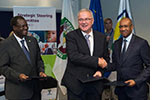 The European Union has committed EUR 1.15 billion in development assistance to the West African region over the next five years. ECOWAS Commission President Kadré Désiré Ouédraogo, UEMOA Commission President Cheikhe Hadjibou Soumaré and EU Commissioner for International Co-operation and Development Neven Mimica signed the Regional Indicative Programme under the 11th European Development Fund (EDF) on 6 July in Brussels. In a statement, the EU said the funds will be allocated toward three main areas of co-operation: 1) peace, security and stability, including migration; 2) regional economic integration and trade, including support for infrastructure and private sector development; and 3) sustainable development of natural resources and biodiversity, which includes food security, nutrition and climate change adaptation.
The European Union has committed EUR 1.15 billion in development assistance to the West African region over the next five years. ECOWAS Commission President Kadré Désiré Ouédraogo, UEMOA Commission President Cheikhe Hadjibou Soumaré and EU Commissioner for International Co-operation and Development Neven Mimica signed the Regional Indicative Programme under the 11th European Development Fund (EDF) on 6 July in Brussels. In a statement, the EU said the funds will be allocated toward three main areas of co-operation: 1) peace, security and stability, including migration; 2) regional economic integration and trade, including support for infrastructure and private sector development; and 3) sustainable development of natural resources and biodiversity, which includes food security, nutrition and climate change adaptation.
In the area of food security and resilience, the 11th EDF specifically refers to the Global Alliance for Resilience (AGIR) recognising the region's efforts to create a coherent framework for action. Strengthening the resilience of vulnerable populations is a strategic objective of the West African region. Six regional programmes will be set up worth EUR 200 million: 1) Sustainable agricultural development in two strategic priority sectors; 2) Pastoralism and transhumance; 3) Food reserves, social safety nets and nutrition; 4) Fisheries and aquaculture; 5) Ebola surveillance and early-warning; 6) Governance.
"Regional integration in West Africa is already bearing impressive fruits and today's signing is the ambitious starting point for preparing new, concrete projects that will benefit the region and its countries," Commissioner Mimica, said. "We will work with a wide range of partners to tackle the challenges that remain in West Africa." The West Africa EDF benefits the 15 ECOWAS member countries and Mauritania. The value of the package is nearly double the EUR 595 million committed under the 10th EDF. The increase in funding comes as the region is working to end the Ebola outbreak in Guinea, Liberia and Sierra Leone ad to recover from its socio-economic impacts. Despite strong economic growth figures, the region also suffers from high rates of employment, particularly among youth. The lack of job prospects prompts large numbers of West African youth to attempt a dangerous and illegal passage into Europe each year.
Press release in English: http://europa.eu/rapid/IP-15-5309_en.htm
Press release in French: http://europa.eu/rapid/IP-15-5309_fr.htm
Boko Haram attacks kill more than 200 in Nigeria
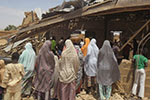 Nigerian President Muhammadu Buhari called for a more rapid deployment of a new regional military force to combat Boko Haram amidst a spike in violence blamed on the militant Islamist sect. More than 200 people were killed in a series of attacks over the past week. At least five people were killed when suspected Boko Haram members attacked worshippers entering a church on 5 July in north-eastern Yobe State. The attack came just days after several female suicide bombers unleashed violence on villages in Borno State, killing dozens of people. The deadliest attack came on 1 July in the village of Kukawa near Lake Chad. More than 50 gunmen opened fire on men saying evening prayers at mosques and carried out house-to-house raids as families gathered to break the Ramadan fast. More the 100 people were killed. President Buhari condemned the killings as "most inhuman and barbaric". The attacks underscore the need "to form a more effective international coalition against insurgency and terrorism in Nigeria and neighbouring countries," the president said in a statement. Despite the bloodshed, the Nigerian leader said the military is making progress against Boko Haram. A former military ruler, Buhari took office one month ago with a pledge to wipe out Boko Haram and end a six-year campaign of violence that has killed thousands of people and displaced 1.5 million. He has spent much of his first weeks in office shuttling to neighbouring countries to iron out details for the joint force, which will also include forces from Chad, Niger and Cameroon. During a meeting last month, the leaders of the four countries pledged to make the force operational by 30 July.
Nigerian President Muhammadu Buhari called for a more rapid deployment of a new regional military force to combat Boko Haram amidst a spike in violence blamed on the militant Islamist sect. More than 200 people were killed in a series of attacks over the past week. At least five people were killed when suspected Boko Haram members attacked worshippers entering a church on 5 July in north-eastern Yobe State. The attack came just days after several female suicide bombers unleashed violence on villages in Borno State, killing dozens of people. The deadliest attack came on 1 July in the village of Kukawa near Lake Chad. More than 50 gunmen opened fire on men saying evening prayers at mosques and carried out house-to-house raids as families gathered to break the Ramadan fast. More the 100 people were killed. President Buhari condemned the killings as "most inhuman and barbaric". The attacks underscore the need "to form a more effective international coalition against insurgency and terrorism in Nigeria and neighbouring countries," the president said in a statement. Despite the bloodshed, the Nigerian leader said the military is making progress against Boko Haram. A former military ruler, Buhari took office one month ago with a pledge to wipe out Boko Haram and end a six-year campaign of violence that has killed thousands of people and displaced 1.5 million. He has spent much of his first weeks in office shuttling to neighbouring countries to iron out details for the joint force, which will also include forces from Chad, Niger and Cameroon. During a meeting last month, the leaders of the four countries pledged to make the force operational by 30 July.
Article in English: http://www.thisdaylive.com/boko-haram-buhari/213781/
Article in French: http://www.jeuneafrique.com/attaque-de-boko-haram/
Agrhymet Centre predicts average to below average rainy season
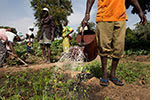 The CILSS Agrhymet Regional Centre told farmers and political leaders to expect average to below average precipitation during the 2015 rainy season. The Centre provided an updated agro-hydro-climatic forecast as part of activities to monitor the progression of the agro-pastoral campaign in West Africa. The predictions are based on ocean surface temperatures and as well as climate modelling from major global forecasting centres. The special bulletin for June 2015 notes persistent warming in the equatorial Pacific due to the El Niño global weather phenomenon. Combined with a cooling trend in the Gulf of Guinea and in the North Atlantic, this indicates that some areas of the Sahel will receive normal to slightly above average precipitation, while parts of the Sudan-Sahel could experience rainfall deficits. The onset of rainy season was delayed in some parts of the West Africa and the Sahel, and Agrhymet predicts periodic dry spells in the coming months culminating in an early end to the rainy season in some areas. The bulletin recommends that regional actors closely monitor weekly forecasts from national meteorological services and consult frequently with agricultural extension experts. It urges farmers to choose drought-resistant crop varieties and practice water-conscious farming techniques.
The CILSS Agrhymet Regional Centre told farmers and political leaders to expect average to below average precipitation during the 2015 rainy season. The Centre provided an updated agro-hydro-climatic forecast as part of activities to monitor the progression of the agro-pastoral campaign in West Africa. The predictions are based on ocean surface temperatures and as well as climate modelling from major global forecasting centres. The special bulletin for June 2015 notes persistent warming in the equatorial Pacific due to the El Niño global weather phenomenon. Combined with a cooling trend in the Gulf of Guinea and in the North Atlantic, this indicates that some areas of the Sahel will receive normal to slightly above average precipitation, while parts of the Sudan-Sahel could experience rainfall deficits. The onset of rainy season was delayed in some parts of the West Africa and the Sahel, and Agrhymet predicts periodic dry spells in the coming months culminating in an early end to the rainy season in some areas. The bulletin recommends that regional actors closely monitor weekly forecasts from national meteorological services and consult frequently with agricultural extension experts. It urges farmers to choose drought-resistant crop varieties and practice water-conscious farming techniques.
Bulletin in French: http://www.agrhymet.ne/PRESASS2015.pdf
More info in English: http://www.fews.net/outlook-update/june-2015
Ivoirian president launches Energy Leaders Group
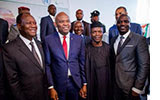 Public and private sector leaders came together in an effort to forge a path toward achieving sustainable energy for all West Africans. Ivorian President Alassane Ouattara presided over the launch of the African Energy Leaders Group (AELG) for West Africa on 30 June in Abidjan. Also in attendance were Nigeria's vice president and the prime ministers of Benin, Côte d'Ivoire, Mali, Niger and Togo. The AELG is a continental initiative unveiled during the 2015 World Economic Forum with the aim of promoting political and economic strategies to end energy poverty and sustainably fuel growth on the continent. West Africa is the first African sub-region to initiate a regional branch of the AELG. Speaking on behalf of President Ouattara, Ivorian Prime Minister Daniel Kablan Duncan said the West African sub-group of the AELG will seek to leverage public-private co-operation around resource mobilisation. "The emphasis will be on practical, appropriate measures that will contribute to the creation of a favourable environment for investment," Duncan said. The African Development Bank (AfDB) will host the AELG secretariat at its headquarters in Abidjan. In a statement, the Bank said the West Africa group has already devised concrete plans for reforms in the sector and identified viable projects for investment. For the first year, priority projects at both regional and national level fall into three main categories: hydroelectric power; gas-to-power; and solar power, with a particular focus on the Sahel.
Public and private sector leaders came together in an effort to forge a path toward achieving sustainable energy for all West Africans. Ivorian President Alassane Ouattara presided over the launch of the African Energy Leaders Group (AELG) for West Africa on 30 June in Abidjan. Also in attendance were Nigeria's vice president and the prime ministers of Benin, Côte d'Ivoire, Mali, Niger and Togo. The AELG is a continental initiative unveiled during the 2015 World Economic Forum with the aim of promoting political and economic strategies to end energy poverty and sustainably fuel growth on the continent. West Africa is the first African sub-region to initiate a regional branch of the AELG. Speaking on behalf of President Ouattara, Ivorian Prime Minister Daniel Kablan Duncan said the West African sub-group of the AELG will seek to leverage public-private co-operation around resource mobilisation. "The emphasis will be on practical, appropriate measures that will contribute to the creation of a favourable environment for investment," Duncan said. The African Development Bank (AfDB) will host the AELG secretariat at its headquarters in Abidjan. In a statement, the Bank said the West Africa group has already devised concrete plans for reforms in the sector and identified viable projects for investment. For the first year, priority projects at both regional and national level fall into three main categories: hydroelectric power; gas-to-power; and solar power, with a particular focus on the Sahel.
Article in English: http://www.se4all.org/west-african-energy-leaders-group/
Article in French: http://www.afdb.org/fr/energy-leaders-group-14482/
Who's Who? Amos Sawyer, former interim president of Liberia
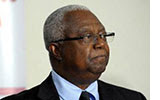 "Consistent in principle, consistent in courage and consistent in commitment". This is how Liberian President Ellen Johnson Sirleaf described former head of state Amos Sawyer as she bestowed the nation's highest honour in 2011. President Sirleaf and ECOWAS Commissioners paid similar homage to the Liberian statesman as he celebrated his 70th birthday on 15 June. In four decades in public life, Sawyer has been scholar, activist, leader and mediator, serving Liberia, West Africa and the continent. His first avocation was academics, and he earned a PhD in political science before the age of 30. His textbook knowledge was reinforced with real world experience from early on. In the 1970s he became a founding member of the Movement for Justice in Africa (MOJA), which resisted the settler oligarchy in Liberia and supported independence movements in Guinea-Bissau and across the continent. When ECOWAS forces moved in to take on Charles Taylor's rebels, the regional organisation called on Sawyer to serve as president of the interim government of national unity, charged with negotiating peace and restoring democracy. "I was motivated by what I thought was an opportunity to reconcile and reform," Sawyer said of his decision to accept the post. "Our thinking was, the sooner we can work ourselves out of business, the better." Initially intended to last six months, Sawyer's mandate was extended to four years as Taylor's forces breached various peace deals and fighting waged on. After Taylor won the presidency in 2007, Sawyer went to work building the civil society sector through his Centre for Democratic Empowerment (CEDE) but was eventually forced into exile. ECOWAS and the AU continue to call on Sawyer's talents in the field of governance. He has headed numerous election observation missions and served as Chair of the AU Panel of Eminent Persons of the African Peer Review Mechanism. In 2011 he was also awarded the prestigious Gusi Peace Prize "for his work in the promotion of democratic governance and socio-economic development through regional integration in Africa".
"Consistent in principle, consistent in courage and consistent in commitment". This is how Liberian President Ellen Johnson Sirleaf described former head of state Amos Sawyer as she bestowed the nation's highest honour in 2011. President Sirleaf and ECOWAS Commissioners paid similar homage to the Liberian statesman as he celebrated his 70th birthday on 15 June. In four decades in public life, Sawyer has been scholar, activist, leader and mediator, serving Liberia, West Africa and the continent. His first avocation was academics, and he earned a PhD in political science before the age of 30. His textbook knowledge was reinforced with real world experience from early on. In the 1970s he became a founding member of the Movement for Justice in Africa (MOJA), which resisted the settler oligarchy in Liberia and supported independence movements in Guinea-Bissau and across the continent. When ECOWAS forces moved in to take on Charles Taylor's rebels, the regional organisation called on Sawyer to serve as president of the interim government of national unity, charged with negotiating peace and restoring democracy. "I was motivated by what I thought was an opportunity to reconcile and reform," Sawyer said of his decision to accept the post. "Our thinking was, the sooner we can work ourselves out of business, the better." Initially intended to last six months, Sawyer's mandate was extended to four years as Taylor's forces breached various peace deals and fighting waged on. After Taylor won the presidency in 2007, Sawyer went to work building the civil society sector through his Centre for Democratic Empowerment (CEDE) but was eventually forced into exile. ECOWAS and the AU continue to call on Sawyer's talents in the field of governance. He has headed numerous election observation missions and served as Chair of the AU Panel of Eminent Persons of the African Peer Review Mechanism. In 2011 he was also awarded the prestigious Gusi Peace Prize "for his work in the promotion of democratic governance and socio-economic development through regional integration in Africa".
Tribute in English: http://www.frontpageafricaonline.com/amos-sawyer-statesman
Article in French: http://www.ecowas.int/amos-sawyer-du-liberia/?lang=fr
Publication: Agricultural Growth in West Africa
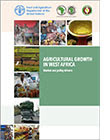 With high population growth and increasing urbanisation, West Africa's changing demographics are often viewed as a challenge for food security. Yet a new report from the ECOWAS Commission, the African Development Bank and the UN Food and Agriculture Organisation finds that West African agriculture has enormous growth potential and in fact stands to benefit from the shifting consumption patterns. With more West Africans becoming food buyers rather than producers - and with an expanding middle class - the market is demanding more choice and higher quality, creating opportunities for post-harvest value addition. To capitalise on these developments, the paper concludes that increased regional integration is needed so that producers can take advantage of economies of scale. Noting that the quality of investment is as important as the quantity, the authors recommend greater investment in public goods such as roads and infrastructure rather than spending on agricultural subsidies. The report aims to contribute to the evidence base as regional policymakers prepare to debate the future orientations of the ECOWAS Common Agricultural Policy.
With high population growth and increasing urbanisation, West Africa's changing demographics are often viewed as a challenge for food security. Yet a new report from the ECOWAS Commission, the African Development Bank and the UN Food and Agriculture Organisation finds that West African agriculture has enormous growth potential and in fact stands to benefit from the shifting consumption patterns. With more West Africans becoming food buyers rather than producers - and with an expanding middle class - the market is demanding more choice and higher quality, creating opportunities for post-harvest value addition. To capitalise on these developments, the paper concludes that increased regional integration is needed so that producers can take advantage of economies of scale. Noting that the quality of investment is as important as the quantity, the authors recommend greater investment in public goods such as roads and infrastructure rather than spending on agricultural subsidies. The report aims to contribute to the evidence base as regional policymakers prepare to debate the future orientations of the ECOWAS Common Agricultural Policy.
Report in English: http://www.fao.org/3/a-i4337e.pdf
Report in French: http://www.fao.org/3/a-i4337f/index.html
